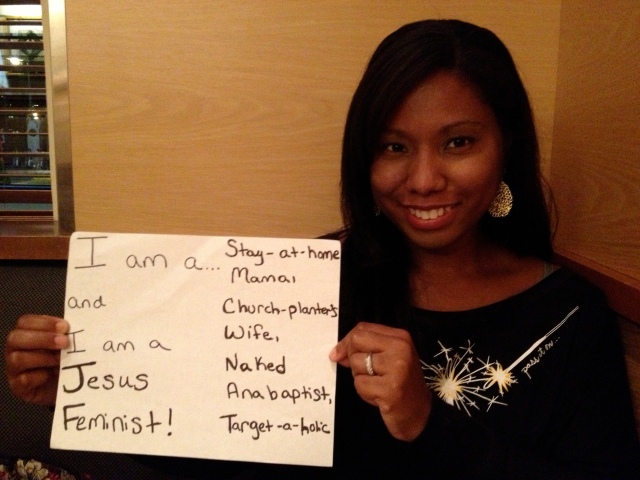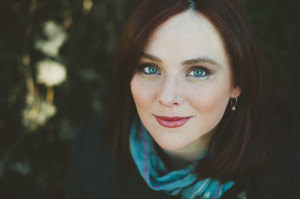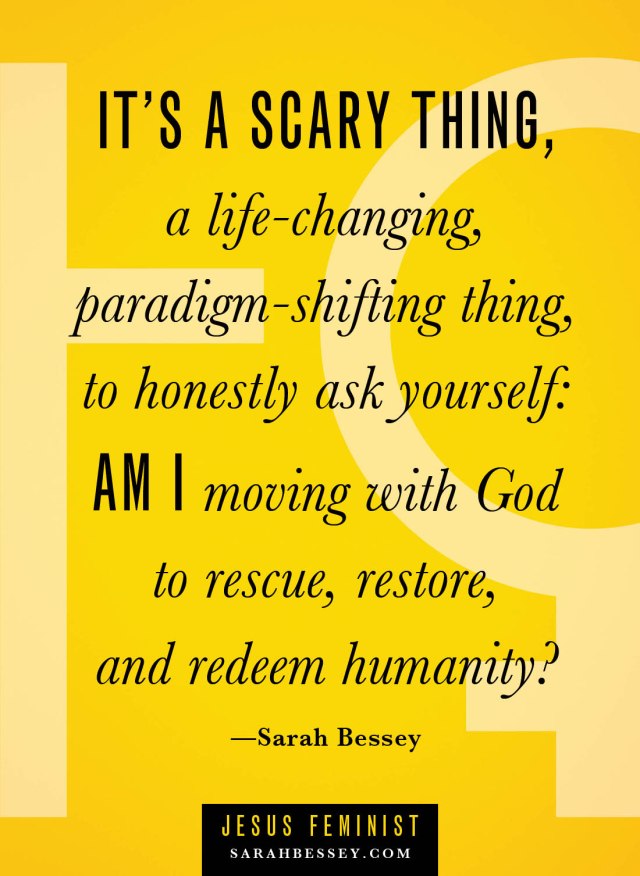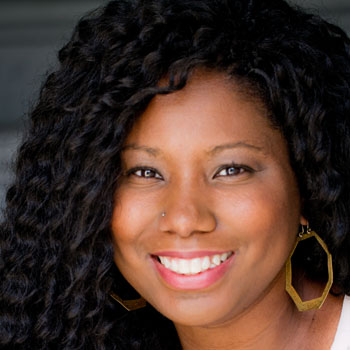Today, I’m so thrilled to share with you my conversation with Sarah Bessey about her book, “Jesus Feminist” that releases tomorrow (Yay!). I have one copy of “Jesus Feminist” to give away, find out how to win it after the interview.
Last year I was worn out by the climate around “biblical womanhood” so I wrote a series called, “Third Way Womanhood” about how I just don’t fit in. Then I was introduced to Sarah’s blog and I thought, ‘Oh good God, here’s another Third Way Woman!‘ I’m thankful for Sarah because she loves the Person of Jesus before positions—her femininity is incredibly Christo-centric. She loves people more than position—she’s the best kind of peacemaker, the one that speaks truth with grace but keeps the circle open for everyone to process truth lovingly, and she’s mindful of the dangers of prescriptive approach to theology—Sarah recognizes we’re all writing our stories with God and she honors those stories before she seeks to prescribe a specific way of being and living. I got this heart from her blog and even moreso in her book. This week, I’ll be linking up with her synchroblog, so you’ll hear more of my thoughts then, but today, I want to introduce you to an incredible Shalom Sistah, Sarah Bessey:
Osheta Moore: I love your humility in this book. It’s refreshing and exactly what this hotly debated topic needs. I love this line from chapter one, “I will practice, painfully, over and over patience and peace until my gentle answers turn away even my own wrath.” You call this practice the way of Jesus. When did you realize a book about womanhood with this gentle, yet prophetic tone was needed?
Sarah Bessey: Thank you for all that! I’m thankful that came through because that’s my heart and the posture I want to have around this conversation. I see myself as more of a bridge builder. I’m not looking at any of this like a war, an argument where I’m out to convince somebody, or take them down, or neutralize—that kind of fighting language doesn’t resonate with me. Like yourself, I’ve benefited from Anabaptist teachings and from peacemaking theology, so to me I felt like regardless of the “righteousness” of the argument or the point, your heart should be to make space everybody on all points so that no one is left behind. You may win the argument, but you’re not really changing anyone’s heart, mind or soul. You’re not creating space for them to feel loved or to feel that there is peace there or you’re creating space for peace. You know, there are not two sides to this and we actually have more in common than we think. That was really my heart going into the book. Some may call it provocative, and I’m only wiling to go so far as calling it a provocative love letter that comes from a heart for the church and a lot the thankfulness. To me this book is more of an invitation to imagine what life looks like on the other side of these conversations. Once we get some of these issues resolved, and I believe they can be resolved, then what? How can you reflect the Kingdom of God? It’s the “then what” that excited me because there’s some really prophetic goodness and rich material to look at there.
OM: Because God’s bigness cannot be contained in our small boxes, you’ve chosen to pursue “a third way, a redemptive way”. As an Anabaptist, this approach to womanhood resonates with me, will you discuss more of this third way approach you’d like to take to the conversation?
SB: I see so much of the Kingdom of God as establishing that way. For instance, in the marriage conversation, people who hold to a really hierarchical or patriarchal view within the church, often will say, “You don’t want to be affected by the culture, so someone needs to be the leader or the head of the home.” But I really feel like that is more a reflection of ancient culture. Our culture right now, in the modern world in a marriage, it’s all about yourself. So you go through your marriage with the mindset that, “it’s great as long as you’re here and your supporting me…but I’m submitted to no one”. So both partners are not really submitted to anyone. In some circles, “submitted” is a terrible word. A third way I feel that Paul taught, that’s reflected in the life and teachings of Jesus, is not that one person submits and not that no one submits, but that third way that we both submit. In this third way approach, we lay down out lives for each other and it’s always a little subversive and it always counter-cultural. It’s almost even counter-culture within the church to examine some of the unfortunate teachings we’ve picked up from ancient cultures and transplanted along with us, thinking that this is the right way, but really all we’re doing is baptizing another form of secular culture. So the third way would be to say, “well this ancient culture did this… and our modern culture does this…but God has called us to transcend culture”. To me the marriage conversation is a good example of transcending cultures both ancient and modern to reflect the Kingdom of God.
OM: Since you mentioned the word provocative, I wanted say that honestly, I had a hard time with the title of your book. I had a knee-jerk reaction to the word “feminist” juxtaposed with “Jesus”— it felt wrong—probably because there’s a lot of misinformation and negativity around feminism. I know for me, I had to work through a few issues and have my own “aha” moments. Can you talk a little bit about how the title came to be and if you had your own struggles with accepting the label “feminist”?
SB: I get it! That’s the biggest thing I want to tell people when they have that reaction is that I really understand that reaction. I think if there’s any way to offend just about anybody with putting two words together, I think I might have done it! (laughs) The funny thing is, the title itself arose out of a made up label from my own life. I’ve been very passionate and involved in women’s justice issues like maternal health and education for women. This was where my heart was, I loved women, and so, I just started calling myself a “feminist”. There wasn’t a lot of baggage around the word for me. I’ve come to understand in the American Church there’s a lot of baggage though. It’s associated with being angry, bitter, and hating men—but I didn’t have any of these associations. For me, being a feminist was more than “can women serve on the board or be preachers”—it was bigger for me. Those are issues of justice too, but for me I was asking, “how does our culture affect girls coming up with eating disorders, or self harm or sexual/physical sexual abuse”, these were the questions I was asking when I started calling myself a feminist. So people of course asked, “well, what kind of feminist are you?” meaning are you all these stereotypes. So, just as one of these cheeky things I started calling myself a “Jesus feminist”—I am a feminist precisely because I follow Jesus. Because I want to shape my life into the way he has ministered, taught, and lived his life, I’ve been led me down a path of caring about our relationships, our sisters around the world, my daughters and caring about my mothers. As I was writing the book, I knew I wanted to write about women, the way Jesus encountered women, and how we can encounter each other. So as I was writing the book, I had a chapter called, “Jesus Feminist” and after my agent read it she, pulled this label out and said, “this is you book title! This is the thread that holds your whole book together”. It’s not a book on Christian Feminism, it’s really about the Kingdom of God and what it looks like when we’re walking whole, walking free, and walking together.
OM: I love the opening imagery of women sitting around the fire, talking this thing [God’s Kingdom and women] out. In your book you do a wonderful job spotlighting the women in Jesus ministry, which happens to be one of my favorite things to do with women when we’re sitting around together—I love to hear our favorite Jesus stories or the women in his ministry that we’ve connected with. Who is your favorite woman in Jesus’ ministry?
SB: Oh, this is so hard to choose, isn’t it? I love the story about the Daughter of Abraham because there’s something about calling her out and naming her. There were a few women I had a strong connection with, like I loved Mary and Martha, Tabitha, Junia, or Tabitha! All these women ministered to me, but I keep going back to the account of the Samaritan Woman. The encounter of the woman from Samaria at the well with Jesus has really ministered to me. I love it because he treated her just like anyone else. This is what I love about the ministry of Jesus: he treated women like everyone else—we didn’t get preferential treatment, nor did we get deferential treatment. We did get treated more poorly, neither did we get treated any better. We weren’t treated like we were too we weak and gently and sweet for the conviction of the Holy Spirit, you know, “Go and sin no more”. He engaged women the same way he engaged everyone else. He just met them where they are! I think, this is the longest theological conversation Jesus had recorded in Scripture and it is with this woman, who shouldn’t have even garnered his attention or his notice! But not only does he notice her, but he sits and engages her and teaches her and then when she returns to her life, her whole community is turned around! She became an evangelist because she told her story! It always stands out to me. Another one who stands out to me is a woman who was listening to Jesus teach and she calls out a very common blessing at that time was, “blessed is the woman who gave birth to you and blessed is the woman who nursed you”, you know, because she gave birth to greatness. Jesus’ response seemed like a bit of rebuke but actually it was a complete subversion, counter-cultural thing where he took that old fashioned, “bless your heart” and turns it on it’s head and says, “No, blessed is the one who hears the word and obeys”. So women are no longer blessed because they give birth to greatness, but everyone, men and women are blessed if they hear the Word of God and obey and the Word being Jesus Christ. And I remember saying, “oh, that’s just wonderful!” Because you’re no longer relying on the father you have or the husband you have or the men you give birth to, you can stand before God on your own souls’ two feet, and that’s just beautiful. Women don’t have to rely on second hand blessings anymore!
OM: The last chapter, “Kingdom Come” was one of my favorites, although I loved the whole book. I really gravitate towards that Kingdom language, primarily because of my love for Anabaptist teachings on the Kingdom of God. For me, when I think about the Kingdom of God coming, I think about shalom. You know— brokenness made whole, God’s harmony entering into the world’s dissonance. Sarah, what does shalom look like to you?
SB: The thing surprised me as I learn, is I feel like I’m very much at the surface of shalom. I feel like I’m like Mary, sitting at the feet, learning what that is. One of the biggest thing I’ve absorbed and I’m trying to work into my life and the Holy Spirit has been giving me clarity about is that it’s a verb. Shalom is a verb. It’s a not a noun, it’s not a place; it’s not a concept even. It’s something we work into our lives and something we rest into. We don’t strive for it but we are co-creating [shalom] with God. So that aspect of it, that you are seeking shalom or making space for shalom, that you are practicing shalom, really takes on the form of peacemaking in our lives. I think that’s a place where people engage with pacifism or Christian non-violence as peacemaking and really, that’s just one aspect of it. Peacemaking extends to your marriage, it extends to your neighborhood, it extends to how you raise your tinies, it extends to your community of faith where you gather before you scatter back into the world. So all those things are something I feel like I’m still really learning. This is where the last chapter, I really get into what it looks like for us to live this out in our lives. I have some really practical, concrete ideas because this had to become concrete for me. Where I had to ask, “ok but what does this mean? What does this look like? What are these glimpses of restoration and reconciliation? What do I do with all of it?” That what the last chapter was born out of my wondering and questioning of what does all this look like for me.
OM: So my final question for you Sarah, comes from the thermos you pass around the fire in chapter one full of tea. Then before we jump into some of the “hard” Scriptures about women in the church you say, “pass the thermos”. And as a reader I was like, “OK…. WHAT IS IN THAT THERMOS?” So Sarah, what would be in your thermos if we were to sit around a fire together?
SB: (laughs) Oh, just a good, Basic English Breakfast. Always. Black tea. Like an orange pekoe, English breakfast, strong black tea with a bit of milk.
Thank you Sarah, for stopping by and sharing your wisdom. You are always welcomed here!
To enter to win a copy of “Jesus Feminist”, please comment below with your favorite hot drink that would be in your thermos. I’ll choose one at random and post the winner on Friday. I’ll send you your book AND your favorite drink. Because seriously, y’all—you’re going to want to snuggle in with your cup and get lost in Sarah’s words—I’m confident you’ll come back up a better woman with a clearer Kingdom perspective and a deeper love for Jesus.
Pouring me a cup of vanilla chai tea now,





Comments (20)